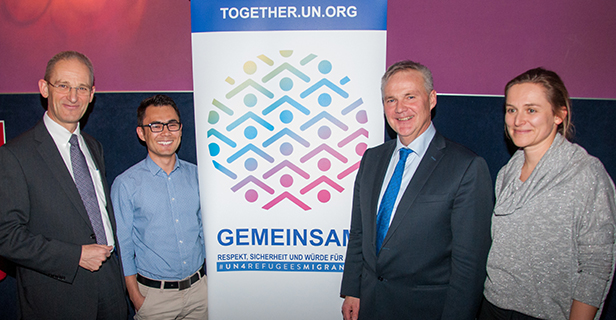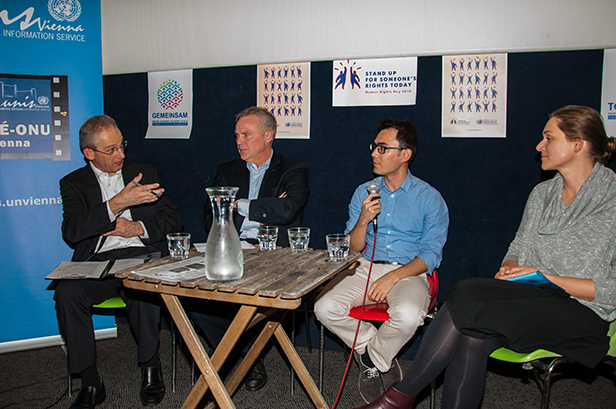
"The world needs to understand that refugees are not trying to flee to have a better life. They are just trying to have a life."
In two sentences, one of the real-life protagonists of the documentary 'The Crossing' conveyed the sense of misery felt by thousands of refugees. War and persecution force them to abandon their old lives and to embark upon a harrowing journey into an uncertain future.
On the occasion of Human Rights Day (10 December), the United Nations Information Service (UNIS) Vienna screened director George Kurian's intimate record of this ordeal, in cooperation with the United Nations High Commissioner for Refugees (UNHCR) Office in Austria, the Global Migration Film Festival, this human world (THW) Film Festival and Topkino.
The event was organized to showcase of the UN-system wide campaign "TOGETHER: Respect, Safety and Dignity for All", which was launched by the UN Secretary-General in September this year to promote diversity, inclusion and global solidarity.
The Crossing introduces a motely group of Syrians - journalists, engineers, a musician and a psychologist - as they climb aboard an old unseaworthy fishing boat. They explain why, having lost their livelihoods and even some of their family members, they are willing to risk their lives and those of their children for the small glimmer of hope of a new life in Europe.
Despite the devastation and deprivation suffered throughout their long journey, they arrive safely on the shores of Italy. One of the women, Aifa, euphorically proclaims their arrival to be "the end of an era. The era of waiting for nothing. The era of losing time. The era of losing your life."
Yet, after weeks and months of being moved from one refugee camp to another, painful separations from their new-found friends, being condemned to inactivity, while only able to watch internet videos of their hometown being ravaged, the immense uncertainty takes a toll on their spirits.
The film screening was followed by a panel discussion with Friso Roscam Abbing, Head of Communication and Outreach at the European Union Agency for Fundamental Rights, Ruth Schöffl, Spokesperson for the UN Refugee Agency (UNHCR) Office in Austria and Asif Safdary, a former refugee from Afghanistan who came to Austria as an unaccompanied child refugee and now works as an Integration Ambassador. The talk was moderated by UNIS Director, Martin Nesirky.
Asif Safdary started the conversation by telling the audience an Afghan saying: "The sea is a very dark and deep graveyard." He emphasized that despite all the hardships the group in the film had to endure - both at sea and on land in Europe- they are still the lucky survivors. Notwithstanding the depression and sense of having been uprooted that many of them suffered, the Crossing remains in its essence a story of hope.
Mr. Safdary also mentioned that his experience of successful integration is merely a sequence of strokes of luck. The hurdles to starting a new life as a refugee are in fact very high. As an Integration Ambassador, he is engaged in various organizations to help others have an easier start than he had himself.
Friso Roscam Abbing of the EU Fundamental Rights Agency said it was outrageous that people have to flee persecution in such a dangerous way, devoid of human dignity. Both he and Ruth Schöffl of UNHCR Austria highlighted the importance of promoting Best-Practice-models for safe migration and research into viable alternatives to the migration management as is practised today.
"Not only international organisations need to join in the effort to facilitate migration and to alleviate the societal pressures it causes. Everyone has a role to play," said Mr. Roscam Abbing. "This is why the TOGETHER campaign is of such importance. We need to reconnect with our role as European citizens, which entails not only rights, but also responsibilities towards our neighbours."
In the end, one quote from the film perfectly captures the insights of the discussion: "What is it that Syrians want from themselves and from others? It's not just food and shelter that a refugee needs; what a refugee needs is to be found."
